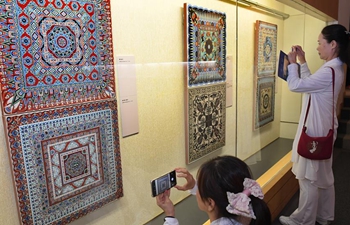WASHINGTON, May 29 (Xinhua) -- The U.S. Treasury Department has said that no major trading partner of the United States meets the standard of currency manipulation.
In its Semiannual Report on International Economic and Exchange Rate Policies to the U.S. Congress released on Tuesday, the Treasury Department concluded that no major U.S. trading partner met the criteria to be labeled as a currency manipulator during the four quarters ending December 2018.
However, it put China, Germany, Ireland, Italy, Japan, South Korea, Malaysia, Singapore and Vietnam on its "monitoring list," which means foreign exchange policies of the nine countries will bear close attention of the U.S. government.
The Treasury Department called on China to take necessary steps to avoid "a persistently weak currency," noting that improved economic fundamentals and structural policy settings would underpin a stronger renminbi (RMB) over time.
In response to the report, Chinese Foreign Ministry Spokesperson Lu Kang said Wednesday at a regular press conference that the U.S. conclusion against labeling China a currency manipulator is consistent with common sense and the shared view of the international community.
"We hope the United States will respect facts and market laws and not politicize exchange rates," Lu said. "We have repeatedly advised it to abide by multilateral rules and not conduct unilateral assessments of other countries' exchange rates."
China will resolutely deepen market reform of the exchange rate regime, continue to improve the managed, floating regime based on market supply and demand and with reference to a basket of currencies, and keep the RMB exchange rate basically stable at an adaptive and equilibrium level, Lu added.
Adam Posen, president of Peterson Institute for International Economics, a Washington, D.C.-based think tank, said before the release of the Treasury report earlier on Tuesday that it's "pretty close to absurd" to accuse China of currency manipulation as China basically has not manipulated its currency for the last several years.
The Bank Negara Malaysia (BNM), which is also on the "monitoring list," said on Wednesday that the country supports free and fair trade, and does not practise unfair currency practices.
"Malaysia adopts a floating exchange rate regime. The ringgit exchange rate is market-determined and is not relied upon for exports competitiveness," the central bank of Malaysia said in a statement, adding that BNM intervention over the last few years has been in both directions of the foreign exchange market.
In the biannual report, the U.S. Treasury Department also revised the thresholds it uses to assess where unfair currency practices or imbalanced macroeconomic policies may be emerging, allowing it to monitor a wider range of countries.
As one of the three criteria for inclusion on the "monitoring list," a "material current account surplus" is one that is at least 2 percent of gross domestic product (GDP), compared with 3 percent of GDP in previous threshold.
If a country actively intervenes in foreign exchange markets for six out of 12 months, rather than the previous eight-month threshold, it will be closer to being monitored. Additionally, a "significant bilateral trade surplus" with the United States is one that is at least 20 billion dollars in goods surplus, consistent with previous threshold.
An economy meeting two of the three criteria is placed on the "monitoring list," the department said. However, if the U.S. trade deficit with a country accounts for a large portion of its overall trade deficit, the country will also be added to the watch list, even if it doesn't meet two of the three criteria.
The department reviewed and assessed the policies of an expanded set of 21 major U.S. trading partners, whose bilateral goods trade with the United States exceeds 40 billion U.S. dollars annually. Previously, it only covered the 12 largest trading partners.













